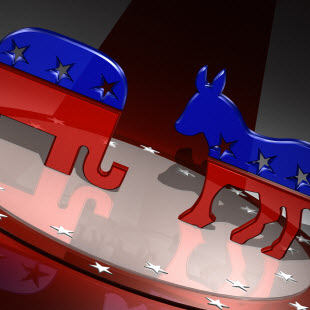A Bipartisan Appeal

We've all been frustrated at the dysfunction of Washington over the past few years. Most of it has been directed at Congress which can see to do anything except dig its heals in on partisan sides. We all mainly want the two sides to start doing things in a bipartisan way. Yet, all we get is more and more partisan bickering between the two sides.
In an April 2012 Gallup poll, Congress's approval rating sat at 17%. Do you think that's pretty low? That is actually up from a 10% approval rating set back in February 2012... the lowest it has been. Congress is supposed to be the governing body of the people, yet we see it more and more as the governing body of the big businesses, lobbyist, and anyone with pockets full of endless money. And our politicians aren't out representing their constituents. They seem to only be out representing their core party constituents and their political party as a whole. Their political ideology seems to come above all else... even what's best for our nation.
 The reason why Congress's approval rating has remained so low is that we, as the people, want them to work together. In 2010, Tea-Party Republicans made the word compromise a dirty word and began to kick out those Republicans that had crossed the aisle to work with Democrats on key issues, and there lays the problem. The Tea-Party Republicans apparently didn't look to close to history as compromise is exactly how our government was set-up. It is what determined two legislative chambers and the term length of each chamber. It's how our nation's capital became situated along the Potomac River. It's even how slaves in southern states got counted as 3/5ths of a person before the abolition of slavery when it came to counting for representation in Congress and electoral votes. But should the blame be on the Tea-Party itself? Not entirely. Yes, the fueled the flames with more incendiaries to get elected, but it was still the people at large that brought them to that point. Voters wanted to think that Tea-Party Republicans were the candidates that would express their angst. However, those candidates took advantage of those feelings for their own personal gains. Most of them still could care less about the voters want... at least until its election time.
The reason why Congress's approval rating has remained so low is that we, as the people, want them to work together. In 2010, Tea-Party Republicans made the word compromise a dirty word and began to kick out those Republicans that had crossed the aisle to work with Democrats on key issues, and there lays the problem. The Tea-Party Republicans apparently didn't look to close to history as compromise is exactly how our government was set-up. It is what determined two legislative chambers and the term length of each chamber. It's how our nation's capital became situated along the Potomac River. It's even how slaves in southern states got counted as 3/5ths of a person before the abolition of slavery when it came to counting for representation in Congress and electoral votes. But should the blame be on the Tea-Party itself? Not entirely. Yes, the fueled the flames with more incendiaries to get elected, but it was still the people at large that brought them to that point. Voters wanted to think that Tea-Party Republicans were the candidates that would express their angst. However, those candidates took advantage of those feelings for their own personal gains. Most of them still could care less about the voters want... at least until its election time.
So where should the blame be placed for Congress not getting along? Simple... the voters. We do elect these people, afterall. And yes, we only get to elect 3-people out of both chambers (1 in the House... and 2 in the Senate) out 535. We elect those that we feel best represent our values and beliefs... mostly based on political party and not based on an individual candidate. And as much as we sit here and say that we want Congress to work in a bipartisan way, we want it done in a way that doesn't go against the very values and beliefs we elected our people for. In short form, it's ok to compromise so long as it's the other side doing it and our side gets what it wants. The biggest obstacle for the past two-years has been the Tea-Party Republicans in Congress blocking anything they don't agree with and refusing to compromise on even any major issue. Politics has always been give and take as I described earlier in the article. But this fringe of the Republican Party wants things a different way. It's their way or no way. They want to show their constituents that they are changing the way Washington works and refusing to even work with the other side (and sometimes even the main part of the Republican Party) to tackle the bigger issues.
There is are two key words at the end of that last paragraph... "bigger issues." It's only the big issues that garner national media attention that the two sides dig in their heals and puff out their chests and act all macho for their core partisan constituents. I would encourage all of you to turn on C-SPAN or C-SPAN2 on any random day when smaller bits of legislation are being debated and voted on. These aren't the big topics you will hear about on the evening news. You probably won't even read about them online unless you actually go searching for them. In those smaller votes, you will come across many that are bipartisan. So is Congress as broken as we seem to think it is? Probably not... except when people are really paying attention.
So if we really want our elected officials to start playing nicer together and to start working in a bipartisan fashion to tackle the issues our country faces, then we need to look at ourselves first. We must start electing people that are willing to work with the other side. They must be willing to talk, to give and take, and to come up with a compromised legislation. Yes, we want to elect people who share our values and that is still just fine. Just make sure they realize that not everyone shares those values and that there is no right or wrong on that. We must all be willing to compromise in our daily lives. What a side might lose with one compromise it might gain in another.
 And what about the moderates that are in Congress? Driving them out of both parties will not help the situation... nor will them simply stepping aside. More than ever now, we need those moderates. They help keep the parties toward the center and are usually at the forefront of any bipartisan deal. When the two sides dig in their heals over any issue, it's the moderates who start working both sides and with other moderates to get something accomplished. It's those elected officials that realize that working together is what is truly best for our country... and it's definitely better than Congress just sitting on its hands and refusing to do anything. So if we want bipartisanship in Congress, it's time we, as the voters, start electing the moderates instead of those candidates on the fringe. Though most of us have already gone through our primaries, this is still something we need to think about when we go to the polls in November; otherwise, we will be watching the same thing unfold in Washington.
And what about the moderates that are in Congress? Driving them out of both parties will not help the situation... nor will them simply stepping aside. More than ever now, we need those moderates. They help keep the parties toward the center and are usually at the forefront of any bipartisan deal. When the two sides dig in their heals over any issue, it's the moderates who start working both sides and with other moderates to get something accomplished. It's those elected officials that realize that working together is what is truly best for our country... and it's definitely better than Congress just sitting on its hands and refusing to do anything. So if we want bipartisanship in Congress, it's time we, as the voters, start electing the moderates instead of those candidates on the fringe. Though most of us have already gone through our primaries, this is still something we need to think about when we go to the polls in November; otherwise, we will be watching the same thing unfold in Washington.
LINKS:



